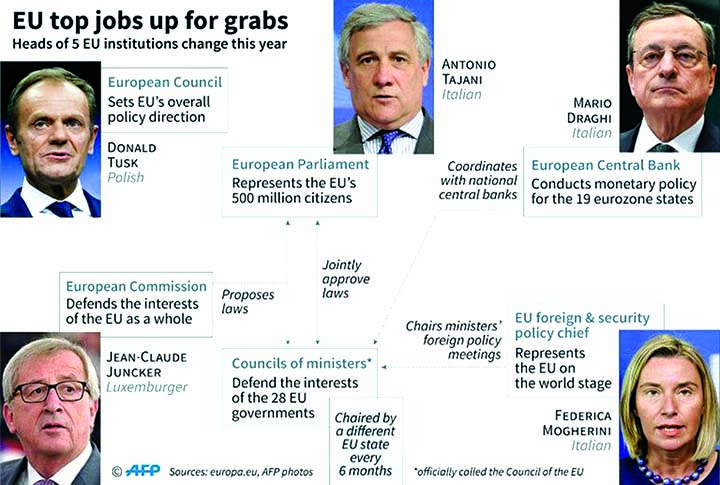
AFP, Brussels :
European Union leaders meet in Brussels on Tuesday for the third straight day of talks aimed at defusing fresh power struggles in a bid to fill the bloc’s top jobs.
The 28 EU leaders who will meet from 11 am (0900 GMT) face a new landscape following the May elections in which the dominant political forces lost some of their clout.
“I think that in a few hours (on Tuesday) we will be able to reach an agreement,” French President Emmanuel Macron said after an 18-hour summit session ended in acrimony on Monday.
Despite signs of progress since the talks began Sunday, the leaders remained divided over a Franco-German compromise on who will become the new chief of the European Commission, the bloc’s executive arm.
“Let’s get serious,” an irritated Macron said.
With challenges from climate change to illiberal democracy, the EU must reform the slow way it takes decisions and avoid becoming “hostage” to political groups, he said
German Chancellor Angela Merkel also said she still “hoped that with good will a compromise will be feasible” when the leaders meet anew on Tuesday.
The compromise Merkel and Macron forged on the sidelines of the G20 summit in Japan on Saturday called for Dutch Social Democrat Frans Timmermans to head the commission, rather than his conservative rival German Manfred Weber.
Weber would instead be put forward for election as speaker of the European Parliament, where he leads the largest political bloc. A liberal candidate would succeed Donald Tusk as president of the European Council of national leaders.
But when Merkel put this to fellow centre-right leaders in the European People’s Party (EPP), several rebelled and the summit was thrown into crisis as heads of government shuttled between side meetings on Sunday evening and Monday.
The EPP is still the biggest bloc in the European Parliament, but it is no longer the dominant force it was before the May elections.
The liberals, which include Macron supporters, are increasingly assertive over the choice of top jobs after they and the Greens made huge gains in those polls.
Even though the Social Democrat bloc also lost ground, Timmermans, the commission’s vice president, emerged as a compromise candidate to head the powerful executive.
Under a new plan, Timmermans would run the commission and the EPP’s Kristalina Georgieva, a Bulgarian who is currently CEO of the World Bank, would become European Council president, several European sources told AFP.
But Bulgarian Prime Minister Boyko Borissov later told his country’s news media in Brussels that the liberals were blocking Georgieva for council chief.
Meanwhile, sources said, a liberal could replace outgoing diplomatic chief Federica Mogherini of Italy. That could either be Belgian prime minister Charles Michel or Danish politician Margrethe Vestager, the current anti-trust commissioner.
As for speaker of the European Parliament, the sources added, Weber could serve the first term of two and a half years, then Guy Verhofstadt, a former Belgian prime minister who leads the liberal group in the assembly, serve the next term.
An EU summit on June 20-21 had already failed to break the stalemate over candidates.
For a nominee to go forward, he or she must secure the backing of 21 of the 28 EU leaders, representing 65 percent of the bloc’s population.
The European Parliament, which is also involved in the decision-making, is to debate the candidates in its inaugural post-election session starting Tuesday.
Following talks yesterday, Dutch Social Democrat Frans Timmermans was favored to take the top European Commission post.
That option didn’t sit well with some EU member states, as Timmermans has been a vocal supporter of the refugee quota distribution system and threatened legal action in order to improve rule of law in Hungary and Poland.
“We want somebody on the presidency of the commission who doesn’t have a negative view on our region. Mr. Timmermans is not acceptable for us. That’s it,” Czech Prime Minister Andrej Babis told reporters as he arrived in Brussels.
Timmermans main challenger Manfred Weber, a German EU lawmaker with the center-right European People’s Party (EPP), could possibly end up being the speaker of the European Parliament. Going into the talks, Weber had been favored to succeed Juncker, but appears to have slipped in the rankings during negotiations.
The talks in Brussels came as the European Parliament opened its first post-election session in Strasbourg on Tuesday.
The opening session was disrupted by some newly elected legislators from right-wing parties, Catalan independence supporters and others.
Some lawmakers with the Brexit Party were seen turning their backs while the EU’s anthem “Ode to Joy” was playing.
Once the 28 EU leaders make a final decision on the candidates for the top jobs, these must be approved by the European Parliament. Lawmakers are due to vote on a new leader for the European Parliament on Wednesday.
The new session follows elections in May that saw the bloc’s two traditional center-right and center-left parties lose votes, while the Greens and far-right parties saw solid gains.

